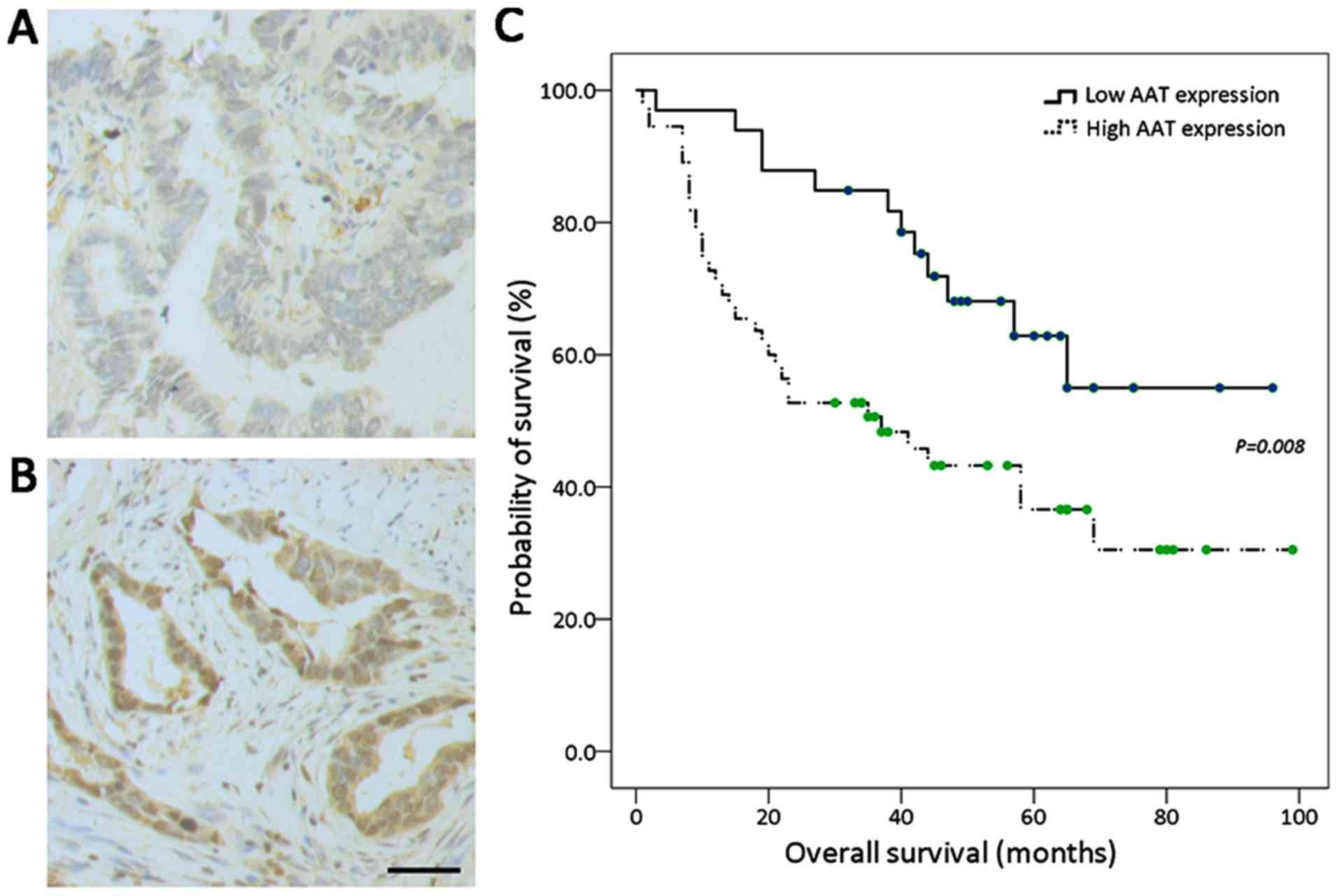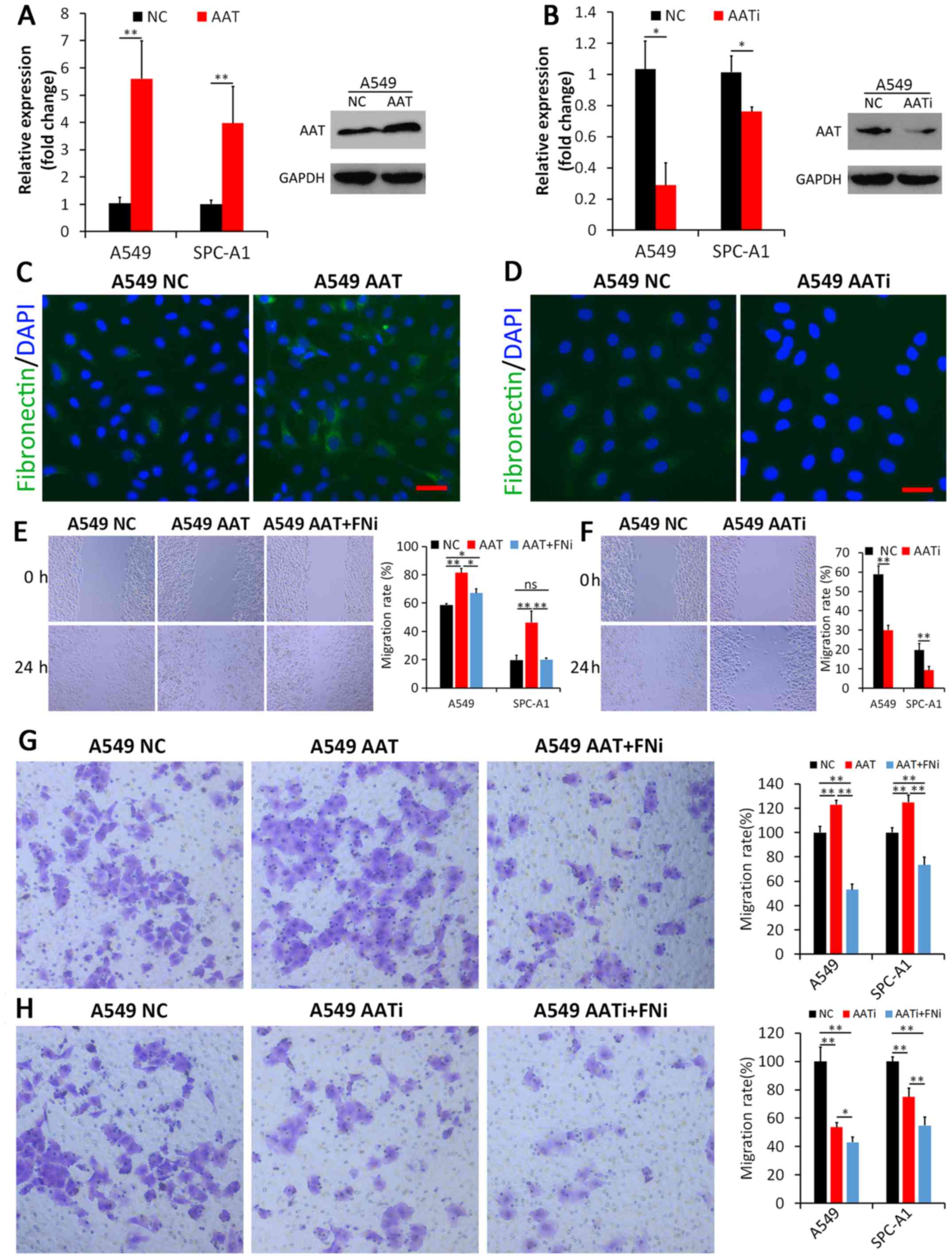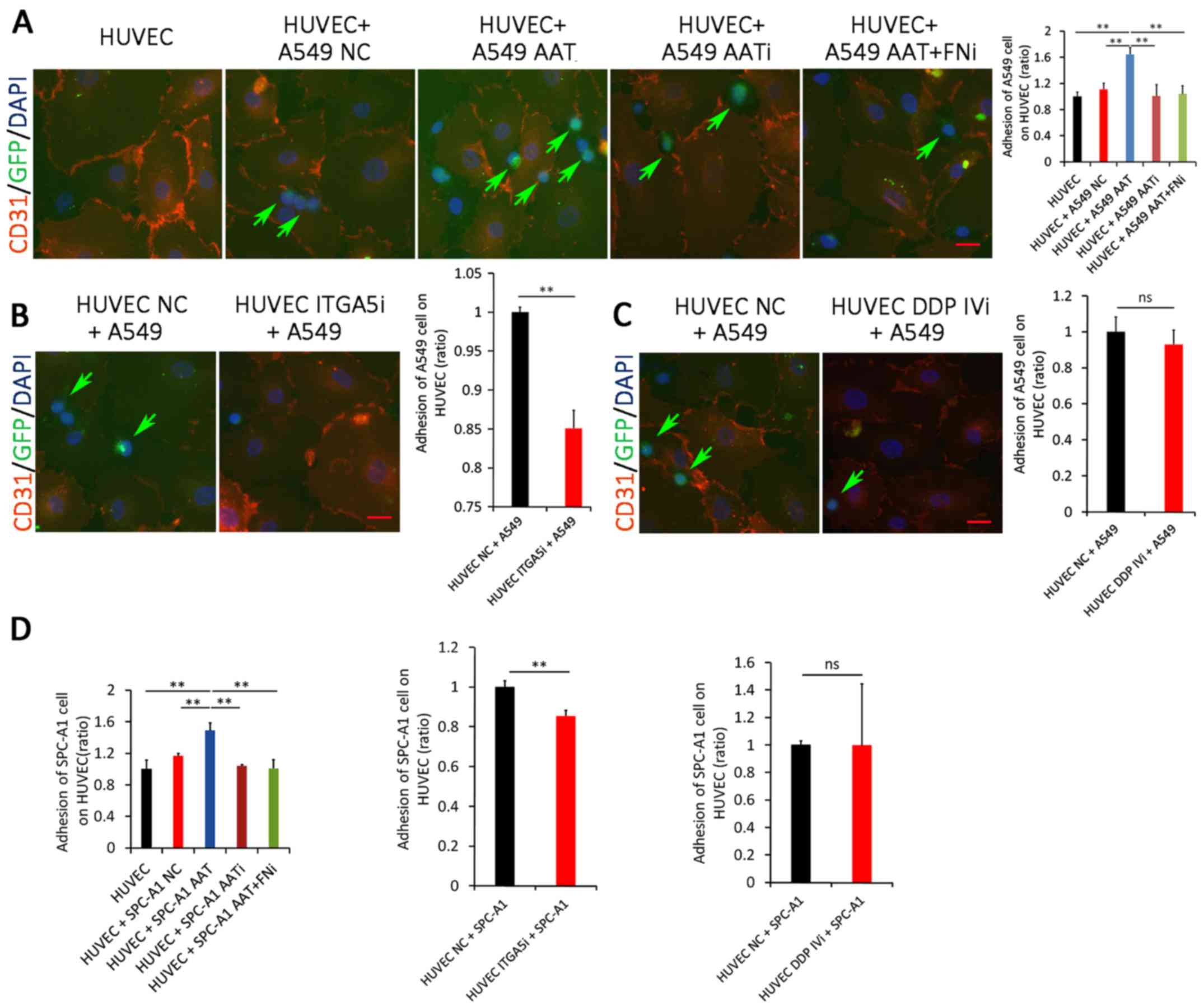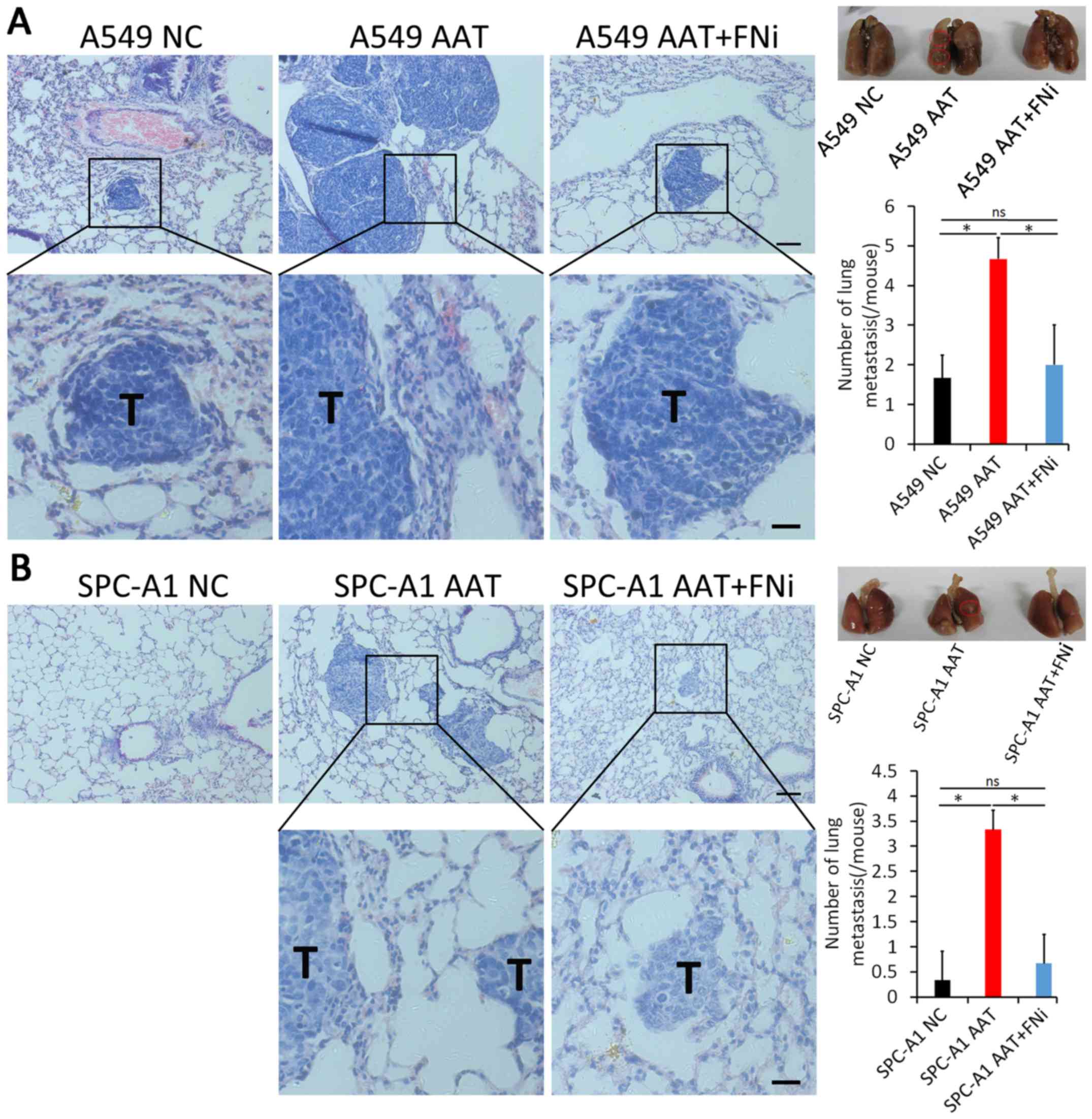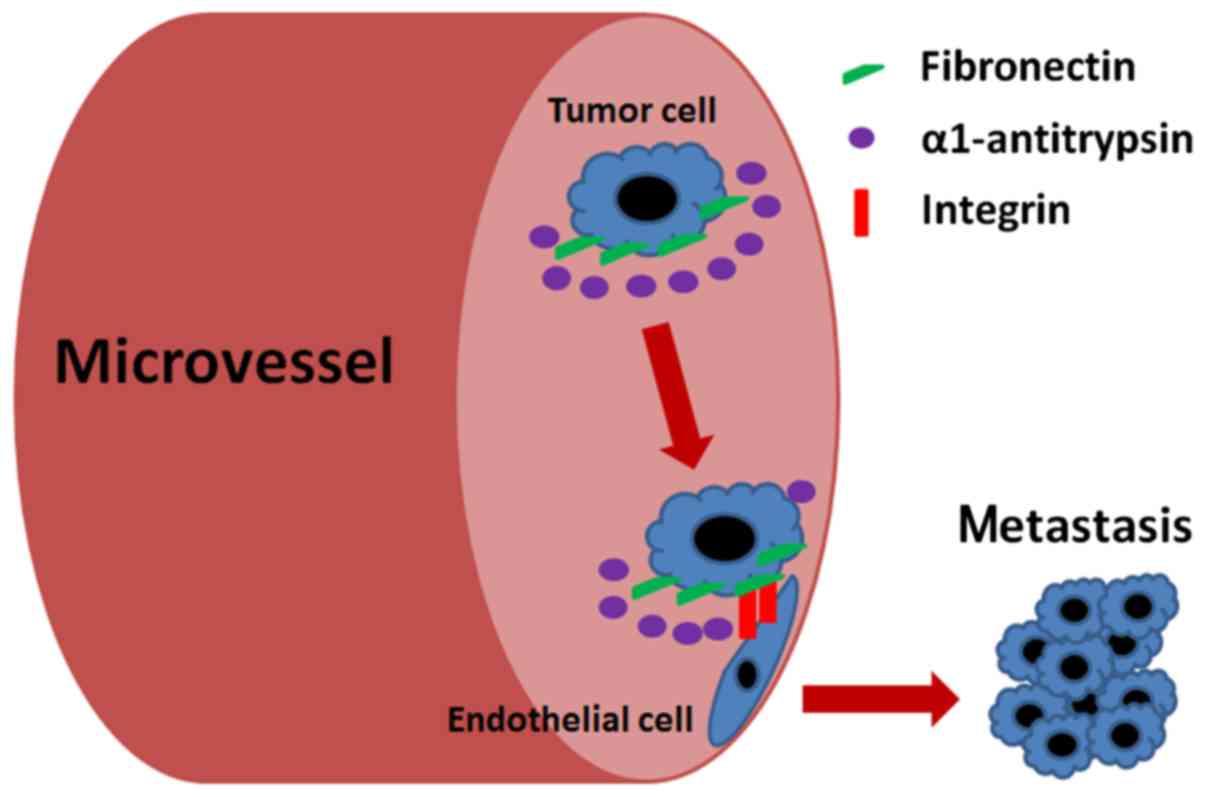|
1
|
Travis WD: Pathology of lung cancer. Clin
Chest Med. 23:65–81. viii2002. View Article : Google Scholar : PubMed/NCBI
|
|
2
|
Hanahan D and Weinberg RA: The hallmarks
of cancer. Cell. 100:57–70. 2000. View Article : Google Scholar : PubMed/NCBI
|
|
3
|
Comunale MA, Rodemich-Betesh L, Hafner J,
Wang M, Norton P, Di Bisceglie AM, Block T and Mehta A: Linkage
specific fucosylation of alpha-1-antitrypsin in liver cirrhosis and
cancer patients: Implications for a biomarker of hepatocellular
carcinoma. PLoS One. 5:e124192010. View Article : Google Scholar : PubMed/NCBI
|
|
4
|
El-Akawi ZJ, Abu-Awad AM, Sharara AM and
Khader Y: The importance of alpha-1 antitrypsin (alpha1-AT) and
neopterin serum levels in the evaluation of non-small cell lung and
prostate cancer patients. Neuro Endocrinol Lett. 31:113–116.
2010.PubMed/NCBI
|
|
5
|
Zelvyte I, Wallmark A, Piitulainen E,
Westin U and Janciauskiene S: Increased plasma levels of serine
proteinase inhibitors in lung cancer patients. Anticancer Res.
24:241–247. 2004.PubMed/NCBI
|
|
6
|
Ioachim E, Charchanti A, Briasoulis E,
Karavasilis V, Tsanou H, Arvanitis DL, Agnantis NJ and Pavlidis N:
Immunohistochemical expression of extracellular matrix components
tenascin, fibronectin, collagen type IV and laminin in breast
cancer: Their prognostic value and role in tumour invasion and
progression. Eur J Cancer. 38:2362–2370. 2002. View Article : Google Scholar : PubMed/NCBI
|
|
7
|
David L, Nesland JM, Holm R and
Sobrinho-Simões M: Expression of laminin, collagen IV, fibronectin,
and type IV collagenase in gastric carcinoma. An
immunohistochemical study of 87 patients. Cancer. 73:518–527. 1994.
View Article : Google Scholar : PubMed/NCBI
|
|
8
|
Pankov R and Yamada KM: Fibronectin at a
glance. J Cell Sci. 115:3861–3863. 2002. View Article : Google Scholar : PubMed/NCBI
|
|
9
|
Williams CM, Engler AJ, Slone RD, Galante
LL and Schwarzbauer JE: Fibronectin expression modulates mammary
epithelial cell proliferation during acinar differentiation. Cancer
Res. 68:3185–3192. 2008. View Article : Google Scholar : PubMed/NCBI
|
|
10
|
Han S, Khuri FR and Roman J: Fibronectin
stimulates non-small cell lung carcinoma cell growth through
activation of Akt/mammalian target of rapamycin/S6 kinase and
inactivation of LKB1/AMP-activated protein kinase signal pathways.
Cancer Res. 66:315–323. 2006. View Article : Google Scholar : PubMed/NCBI
|
|
11
|
Alizadeh AM, Shiri S and Farsinejad S:
Metastasis review: From bench to bedside. Tumour Biol.
35:8483–8523. 2014. View Article : Google Scholar : PubMed/NCBI
|
|
12
|
Burgett ME, Lathia JD, Roth P, Nowacki AS,
Galileo DS, Pugacheva E, Huang P, Vasanji A, Li M, Byzova T, et al:
Direct contact with perivascular tumor cells enhances integrin αvβ3
signaling and migration of endothelial cells. Oncotarget.
7:43852–43867. 2016.PubMed/NCBI
|
|
13
|
Schwarzbauer JE and DeSimone DW:
Fibronectins, their fibrillogenesis, and in vivo functions. Cold
Spring Harb Perspect Biol. 3:a0050412011. View Article : Google Scholar : PubMed/NCBI
|
|
14
|
Hartel-Schenk S, Gossrau R and Reutter W:
Comparative immunohistochemistry and histochemistry of dipeptidyl
peptidase IV in rat organs during development. Histochem J.
22:567–578. 1990. View Article : Google Scholar : PubMed/NCBI
|
|
15
|
Johnson RC, Zhu D, Augustin-Voss HG and
Pauli BU: Lung endothelial dipeptidyl peptidase IV is an adhesion
molecule for lung-metastatic rat breast and prostate carcinoma
cells. J Cell Biol. 121:1423–1432. 1993. View Article : Google Scholar : PubMed/NCBI
|
|
16
|
Piazza GA, Callanan HM, Mowery J and
Hixson DC: Evidence for a role of dipeptidyl peptidase IV in
fibronectin-mediated interactions of hepatocytes with extracellular
matrix. Biochem J. 262:327–334. 1989. View Article : Google Scholar : PubMed/NCBI
|
|
17
|
Cheng HC, Abdel-Ghany M, Elble RC and
Pauli BU: Lung endothelial dipeptidyl peptidase IV promotes
adhesion and metastasis of rat breast cancer cells via tumor cell
surface-associated fibronectin. J Biol Chem. 273:24207–24215. 1998.
View Article : Google Scholar : PubMed/NCBI
|
|
18
|
Livak KJ and Schmittgen TD: Analysis of
relative gene expression data using real-time quantitative PCR and
the 2(-Delta Delta C(T)) method. Methods. 25:402–408. 2001.
View Article : Google Scholar
|
|
19
|
Sun Z and Yang P: Role of imbalance
between neutrophil elastase and alpha 1-antitrypsin in cancer
development and progression. Lancet Oncol. 5:182–190. 2004.
View Article : Google Scholar : PubMed/NCBI
|
|
20
|
Chen XL, Zhou L, Yang J, Shen FK, Zhao SP
and Wang YL: Hepatocellular carcinoma-associated protein markers
investigated by MALDI-TOF MS. Mol Med Rep. 3:589–596. 2010.
View Article : Google Scholar
|
|
21
|
Li Y, Krowka MJ, Qi Y, Katzmann JA, Song
Y, Li Y, Mandrekar SJ and Yang P: Alpha1-antitrypsin deficiency
carriers, serum alpha1-antitrypsin concentration, and non-small
cell lung cancer survival. J Thorac Oncol. 6:291–295. 2011.
View Article : Google Scholar
|
|
22
|
Jia D, Yan M, Wang X, Hao X, Liang L, Liu
L, Kong H, He X, Li J and Yao M: Development of a highly metastatic
model that reveals a crucial role of fibronectin in lung cancer
cell migration and invasion. BMC Cancer. 10:3642010. View Article : Google Scholar : PubMed/NCBI
|
|
23
|
Cao Y, Liu X, Lu W, Chen Y, Wu X, Li M,
Wang XA, Zhang F, Jiang L, Zhang Y, et al: Fibronectin promotes
cell proliferation and invasion through mTOR signaling pathway
activation in gallbladder cancer. Cancer Lett. 360:141–150. 2015.
View Article : Google Scholar : PubMed/NCBI
|
|
24
|
Digiacomo G, Tusa I, Bacci M, Cipolleschi
MG, Dello Sbarba P and Rovida E: Fibronectin induces macrophage
migration through a SFK-FAK/CSF-1R pathway. Cell Adh Migr. 2:1–11.
2016. View Article : Google Scholar
|
|
25
|
Vakonakis I and Campbell ID: Extracellular
matrix: From atomic resolution to ultrastructure. Curr Opin Cell
Biol. 19:578–583. 2007. View Article : Google Scholar : PubMed/NCBI
|
|
26
|
Yousif NG: Fibronectin promotes migration
and invasion of ovarian cancer cells through up-regulation of
FAK-PI3K/Akt pathway. Cell Biol Int. 38:85–91. 2014. View Article : Google Scholar
|
|
27
|
Mitra AK, Sawada K, Tiwari P, Mui K, Gwin
K and Lengyel E: Ligand-independent activation of c-Met by
fibronectin and α(5) β(1)-integrin regulates ovarian cancer
invasion and metastasis. Oncogene. 30:1566–1576. 2011. View Article : Google Scholar
|
|
28
|
Maity G, Choudhury PR, Sen T, Ganguly KK,
Sil H and Chatterjee A: Culture of human breast cancer cell line
(MDA-MB-231) on fibronectin-coated surface induces pro-matrix
metalloproteinase-9 expression and activity. Tumour Biol.
32:129–138. 2011. View Article : Google Scholar
|
|
29
|
Subbaram S and Dipersio CM: Integrin α3β1
as a breast cancer target. Expert Opin Ther Targets. 15:1197–1210.
2011. View Article : Google Scholar : PubMed/NCBI
|
|
30
|
Han S, Sidell N and Roman J: Fibronectin
stimulates human lung carcinoma cell proliferation by suppressing
p21 gene expression via signals involving Erk and Rho kinase.
Cancer Lett. 219:71–81. 2005. View Article : Google Scholar : PubMed/NCBI
|
|
31
|
Knowles LM, Gurski LA, Engel C, Gnarra JR,
Maranchie JK and Pilch J: Integrin αvβ3 and fibronectin upregulate
Slug in cancer cells to promote clot invasion and metastasis.
Cancer Res. 73:6175–6184. 2013. View Article : Google Scholar : PubMed/NCBI
|
|
32
|
Mohri H: Interaction of fibronectin with
integrin receptors: Evidence by use of synthetic peptides.
Peptides. 18:899–907. 1997. View Article : Google Scholar : PubMed/NCBI
|
|
33
|
Cheng HC, Abdel-Ghany M and Pauli BU: A
novel consensus motif in fibronectin mediates dipeptidyl peptidase
IV adhesion and metastasis. J Biol Chem. 278:24600–24607. 2003.
View Article : Google Scholar : PubMed/NCBI
|
|
34
|
Petrache I, Fijalkowska I, Zhen L, Medler
TR, Brown E, Cruz P, Choe KH, Taraseviciene-Stewart L, Scerbavicius
R, Shapiro L, et al: A novel antiapoptotic role for
alpha1-antitrypsin in the prevention of pulmonary emphysema. Am J
Respir Crit Care Med. 173:1222–1228. 2006. View Article : Google Scholar : PubMed/NCBI
|
|
35
|
Ozeri E, Mizrahi M, Shahaf G and Lewis EC:
α-1 antitrypsin promotes semimature, IL-10-producing and readily
migrating tolerogenic dendritic cells. J Immunol. 189:146–153.
2012. View Article : Google Scholar : PubMed/NCBI
|
|
36
|
Malik G, Knowles LM, Dhir R, Xu S, Yang S,
Ruoslahti E and Pilch J: Plasma fibronectin promotes lung
metastasis by contributions to fibrin clots and tumor cell
invasion. Cancer Res. 70:4327–4334. 2010. View Article : Google Scholar : PubMed/NCBI
|
|
37
|
Lal A, Lash AE, Altschul SF, Velculescu V,
Zhang L, McLendon RE, Marra MA, Prange C, Morin PJ, Polyak K, et
al: A public database for gene expression in human cancers. Cancer
Res. 59:5403–5407. 1999.PubMed/NCBI
|















